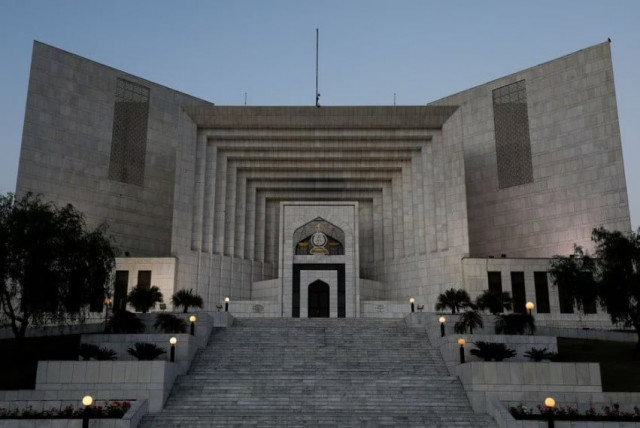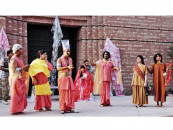Bench in military courts case collapses again
Justice Tariq Masood quits amid lawyer objections

The Supreme Court on Monday witnessed another twist in the case of the trial of 103 suspects in military courts, as the head of the larger bench, Justice Sardar Tariq Masood, recused himself from hearing the matter.
The six-member bench was hearing the intra-court appeals of the federal and provincial governments against the decision of a five-member bench that had declared the trial of civilians in military courts unconstitutional and ordered their transfer to ordinary courts.
During a hearing of the case on Monday, the head of the bench, Justice Sardar Tariq Masood, left over objections from former chief justice Jawad S Khawaja. The bench, however, upheld stay order on the trial of the suspects and referred the matter to the Practice and Procedure Committee for a new bench.
This is the second time that the bench hearing the case has been dissolved. Earlier, a nine-member bench led by then chief justice Umar Ata Bandial was formed, but three judges had left the bench for a variety of reasons.
At that time, the present Chief Justice Qazi Faez Isa, and Justice Sardar Tariq Masood recused themselves from hearing the petitions, pending a decision on the Practice and Procedure Act case, leading to the dissolution of the bench.
Of note is Chief Justice Isa’s prior stance against military courts in the 21st Constitutional Amendment case. Later, Justice Mansoor Ali Shah separated himself from the bench due to objections from the government over his relationship with petitioner Jawad S Khawaja.
The case was, however, heard by the bench led by then Chief Justice Bandial, and including Justice Ijazul Ahsan – who resigned recently – Justice Muneeb Akhtar, Justice Yahya Afridi, Justice Mazahir Ali Akbar Naqvi – who also resigned recently – and Justice Ayesha Malik.
After the retirement of Chief Justice Bandial, a five-member larger bench led by Justice Ijazul Ahsan ruled that the trial of civilians in military courts was unconstitutional and ordered for the transfer of cases to ordinary courts. The federal government filed intra-court appeals against this decision.
Read Military trial of civilians gets SC’s nod
A six-member larger bench, headed by Justice Sardar Tariq Masood, and including Justice Aminuddin Khan, Justice Muhammad Ali Mazhar, Justice Hasan Azhar Rizvi, Justice Musarrat Hilali and Justice Irfan Saadat Khan held two hearings.
During the hearing on Monday, Justice Masood said that a request had been received from Salman Akram Raja for postponing the case until after the general elections. Aitzaz Ahsan also said that his client, Latif Khosa, was also under general adjournment because of his participation in the elections.
Meanwhile, Ahmed Hasan, the lawyer for the petitioner former chief justice Jawad Khawaja raised objections to the bench and said that the matter should be sent to the judges committee for the reconstitution of the bench.
On that lawyer Hamid Khan rose to present his arguments, but Justice Masood stopped him saying that he would not hear the case because objection had been raised that he should be separated from the bench. Later, the bench sent the matter to the judges committee for the formation of a new bench.
Now an interesting situation has arisen in this case. Currently the total number of judges in the Supreme Court is 14, while Chief Justice Isa, Justice Masood and Justice Shah had separated themselves from the bench, while Justice Akhtar, Justice Afridi and Justice Malik had also heard the main case.
So, if the judges committee forms a larger bench of six or seven judges to hear intra-court appeals, then Justice Jamal Khan Mandokhel, Justice Athar Minallah and Justice Shahid Waheed are the three judges who could be added to a six or seven-judge larger bench.



















COMMENTS
Comments are moderated and generally will be posted if they are on-topic and not abusive.
For more information, please see our Comments FAQ